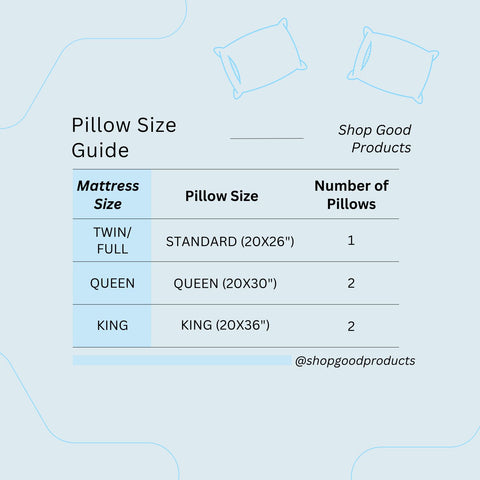Choosing the right pillow size is crucial for ensuring a good night's sleep. Your comfort largely depends on selecting a pillow that complements the size of your bed and aligns with your sleeping position. Whether you sleep on your side, your back, or your stomach, there's a pillow size that's designed to support your sleep posture and enhance your overall sleep quality.
Standard pillows, measuring 20 inches by 26 inches, are a versatile choice and fit well on most beds. They are particularly suitable if you prefer to squish or bunch your pillow while sleeping. If you have a larger bed or need more support for your head and neck, queen-size pillows (20 inches by 30 inches) and king-size pillows (20 inches by 36 inches) are better suited as they provide a more expansive sleeping surface.
For those who need full-body support—especially side sleepers or pregnant women—a body pillow is a worthwhile consideration. Body pillows, usually measuring 20 inches by 54 inches, can improve alignment and reduce pressure points throughout the body. It's about understanding your sleeping needs and matching them with the appropriate pillow size for maximum comfort and restfulness.
Choosing the Right Pillow Size for Your Sleep Needs
Selecting the appropriate pillow size is crucial for both comfort and alignment during your sleep. This choice directly affects your sleep quality, as it influences your sleeping posture and overall comfort.
Understanding Pillow Dimensions
Standard pillows typically measure 20 x 26 inches and are ideal for single or double beds. The queen pillow extends slightly longer at 20 x 30 inches, offering extra width for those who tend to move around at night. For larger beds, the king pillow is sized at 20 x 36 inches, providing ample room on a king-sized bed. For those who prefer full-body support, body pillows measure 20 x 54 inches and are excellent for side sleepers or pregnant women needing additional support.
Importance of Pillow Size for Sleep Quality
The size of your pillow can influence the occurrence of or provide relief from neck pain by maintaining proper alignment of your spine. A pillow with the correct dimensions will support the natural curve of your neck, irrespective of your sleep style. The pillow loft—or height—coupled with firmness, plays a significant role in sleep quality. A pillow that's too high or too firm for your sleeping position can strain your neck, while one that's too soft or low may fail to provide adequate support.
Matching Pillow Sizes with Mattress Dimensions
| Mattress Size | Pillow Size | Number of Pillows |
|---|---|---|
| Twin/Full | Standard (20x26") | 1-2 |
| Queen | Queen (20x30") | 2 |
| King | King (20x36") | 2 |
Matching your pillow size with your mattress size not only affects comfort and aesthetic but also ensures that the bed set appears proportionate. A standard pillow is sufficient for a single sleeper on a full-size bed, while two can fit comfortably on a queen bed. Comparable in width to a queen mattress, two queen pillows provide a flush fit, and king pillowcases on king pillows complement the broad dimensions of a king bed effectively.
Special Considerations for Pillow Selection
Selecting the right pillow involves understanding how different materials, shapes, and firmness levels can affect your comfort and support. The choice is also highly individual, depending on your usual sleep position and specific needs.
Pillow Types and Materials
Memory Foam: Ideal for side and back sleepers, memory foam pillows contour to your head, offering excellent support. However, they can retain heat, so if you're a hot sleeper, look for cooling gel-infused options.
Feather Pillows: Soft and pliable, feather pillows can suit all sleeping positions but may not provide as much neck support as other types, and they may need regular fluffing.
Latex Pillows: They are firm and supportive, great for side and back sleepers who need neck support, and they're also hypoallergenic, resisting dust mites and mold.
Orthopedic Pillows: Designed to provide targeted support, these can benefit those with specific alignment issues, such as needing a wedge pillow for elevated sleeping or a neck pillow for cervical support.
Pregnancy and Body Pillows: Larger and uniquely shaped, these provide additional support for pregnant women or full-body support for side sleepers.
The Effect of Sleep Positions on Pillow Choice
For side sleepers, a thicker, firmer pillow is necessary to fill the gap between the shoulder and neck for adequate alignment.
Back sleepers benefit from a medium-loft and medium-firm pillow to maintain the natural curve of the spine, preventing the head from tilting too far backward or forward.
Stomach sleepers need a soft, flat pillow, or even no pillow at all, to keep the neck aligned with the spine, reducing strain.
Adjusting Pillow Loft and Firmness
-
Adjustable Pillows: Some pillows allow you to add or remove filling to adjust loft and firmness, ideal for restless sleepers who may change positions throughout the night.
-
Knee and Wedge Pillows: Consider specialty pillows like knee pillows for side sleepers to maintain hip alignment or a wedge pillow for support during activities like reading.
-
Children's Pillows: Should be lower loft and softer to match the proportional support needs of a smaller body.
-
Travel Pillows: Compact and easy to pack, they provide neck support to prevent strain during travel.
Remember, your pillow should not only feel comfortable but also support your head and neck in a natural position respective to your typical sleeping posture.



